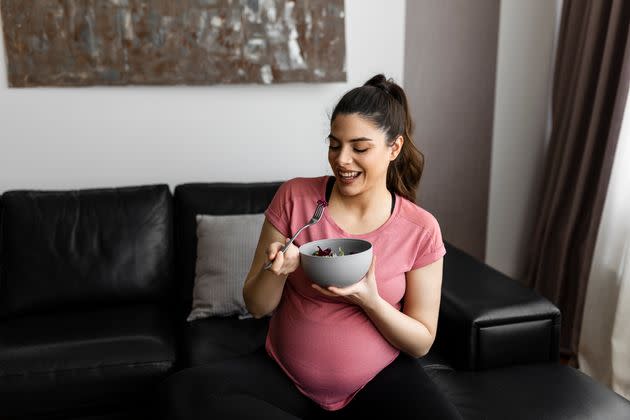4 Foods To Avoid If You're Pregnant - Yahoo News Canada

Being pregnant means your body is going through a lot of changes, physical, hormonal and emotional.
Though you might also have cravings throughout your pregnancy, there are some things that are best avoided.
You've probably heard you can't eat sushi or rare steak, but a lot of people don't know why we're told to avoid these foods.
Dr. Sarah Bonza, a board-certified family medicine specialist explains what foods you shouldn't be eating, and the impact they could have on your body.
Foods to avoid when you're pregnant
1. Raw or uncooked seafood like Sushi
Why: Dr Bonza explains that you can have a risk of being infected with food-borne illnesses like Listeria, Salmonella, and Vibrio cholerae. This can cause infection in pregnancy and lead to miscarriage, early delivery, or infection.
2. Soft cheeses and unpasteurised milk (e.g. feta, blue-veined cheeses)
Why: They can contain Listeria and may cross the placenta, and cause listeriosis that affect the growing baby.
Those that are pregnant have a higher risk of serious problems because of listeriosis.
Listeriosis is a rare infection caused by bacteria called listeria. It usually goes away on its own, but it can make some people seriously ill, according to the NHS.
According to an advice sheet from the Chesterfield Royal Hospital, mould-ripened soft cheeses like Brie and Camembert are "only safe to eat in pregnancy if they've been cooked".
It advises pregnant women to steer clear of soft blue-veined cheeses such as Danish blue, Gorgonzola and Roquefort – unless they've also been cooked.
As for the rest of the cheese board, hard cheeses made from pasteurised milk should be safe to eat in pregnancy.
3. Raw or undercooked meat and eggs
Why: They can harbour salmonella, e.coli, and toxoplasma gondii, a parasite that may cause toxoplasmosis that can lead blindness in the baby.
Dr Bonza says pregnant people are more likely to get infections from these foods as their immune system is suppressed.
The team at My Expert Midwife say it's best to avoid cold cured meats such as salami, prosciutto, chorizo and pepperoni, as these may contain toxoplasmosis.
But well-cooked cold and pre-packed meats such as ham, beef, chicken and turkey are all safe to eat and are packed with protein which is necessary for cell growth, they added.
In the UK eggs produced under the British Lion Code of Practice are safe for pregnant women to eat raw or partially cooked, as they come from flocks that have been vaccinated against salmonella, according to the NHS.
But any eggs that aren't Lion-stamped should be treated with caution, as the experts explain: it's "best to avoid products that contain raw or undercooked eggs such as tiramisu and homemade mayonnaise".
4. Alcohol
Why: Alcohol can interfere with healthy foetal development and can lead to foetal alcohol spectrum disorders which include a multitude of physical, behavioural, and learning problems.
Though the NHS says to avoid drinking any alcohol while pregnant, in recent years there has been debate over how much one glass of wine can impact the foetus.
Of course binge drinking is harmful to both baby and parent, but Emily Oster's book Expecting Better looks at the idea that studies on alcohol consumption during pregnancy aren't always reliable.
She says that though huge quantities of alcohol will cause FASD, there is not much to know about the impact of slowly sipping one or two glasses of wine.
Emily Oster spent years reading studies on the impact of alcohol on pregnant women and from her book concludes that your body is able to metabolise small amounts of alcohol content before it reaches the placenta.
Overall, Dr Bonza concluded that being pregnant puts you at risk for more diseases.
"Knowing that your body is defending not only you, but also the growing baby, and that puts additional immune stress to the maternal physiology.
"Also, when you grow a baby, your immune system adjusts such as being more tolerating to the growing baby, so you 'tone down' your immune system to prevent rejecting the baby, but this comes with the risk of being more immunocompromised, especially with foodborne illnesses such as Listeriosis, Salmonellosis, and Toxoplasmosis," she said.
Comments
Post a Comment